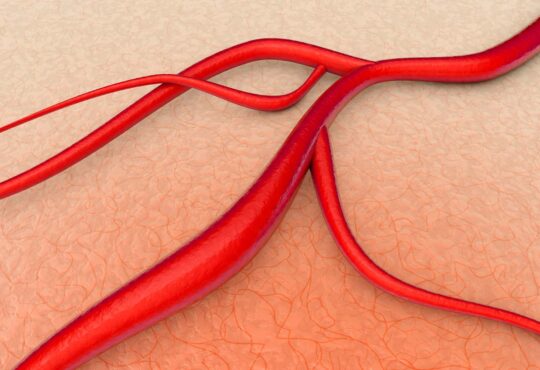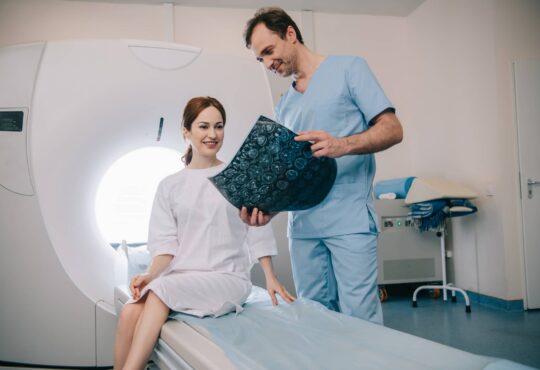Do Your Genes Dictate Your Optimal Diet?

Should you pay a genetic testing service for their nutritional advice?
One major dietary fad today is getting genetically tested to find out what diet is optimal for your genetic makeup. It’s called personalized nutrition or nutrigenomics.
At first glance, this sounds like a great idea. Ever since Watson and Crick discovered DNA, modern medicine has been telling us our genes are our fate. Our genes dictate what diseases we’re going to die from – and when.
Why shouldn’t our genes control our diets as well?
Maybe we’re all sick and tired and chronically ill because we’re not eating the way our genes want.
Therefore, for roughly $100 (more or less), a large number of DNA testing services will analyze a few of your genes (NOT your entire genome, which would cost much more), and, based on their findings, will give you dietary nutritional advice that’s “personalized.”
Then we’ll all know whether we should be eating keto, paleo, or vegan. Whether we should be dining on Spaghetti Aglio e Olio or General Tso Chicken. Or, just maybe, whether we should visit Taco Bell instead of McDonald’s. (Tacos or burritos?)
Some people are suggesting someday we’ll even be sold “customized” food mixed and processed to satisfy our particular, unique genomes.
One size does NOT fit all, they claim, so throw away all that generic advice, and fork over your spit – and your money.
Some Genes Really Do Affect How People Should Eat
* If you have celiac disease, you absolutely should avoid all gluten.
* Most people of color around the world and, I suspect, more white people than we know of, are lactose intolerant. That means they can’t digest the sugar in milk – and so should not drink it.
* Various people have food allergies and should avoid those foods.
However, for most of us, these differences are minor. Knowing gluten doesn’t kill you doesn’t tell you how much wheat or barley you should eat. What if you’re typical Asian eating no grains except (gluten-free) rice?
Besides, even if you can digest milk without an upset stomach because your ancestors raised cattle doesn’t mean it’s healthy for you.
The Big Picture
Modern Homo sapiens began in Africa and spread to live throughout the world. In the process, we changed genetically to adapt to various climates, but lactose tolerance may be the main food-specific adaptation.
No matter where they went, hunter-gatherers had to learn to eat whatever they could. They ate a large variety of plants and animals – a much larger variety than modern people. It doesn’t make sense for our genomes to be specifically adapted to every lizard, weed, and bug our ancestors ever devoured.
Only a relatively few plant species are easily grown in mass quantities. That’s why wheat, corn, rice, barley, and millet are the foundational grains of the world. Breeders have greatly altered plants and vegetables so they’re more suitable to our tastes (and the needs of commercial agriculture).
Individual genetic reactions to various foods are certainly likely, but there’s little evidence that most foods that are healthy or enjoyable for one racial or ethnic group aren’t also healthy or enjoyable for everyone else. That’s why fast-food franchises are spreading around the globe. White and black people around the world now eat rice – and Asians are eating hamburgers. If the hamburgers are unhealthy, they’re probably just as unhealthy for everybody.
Also, although some people need to avoid some foods, there’s no evidence of any foods that might benefit you, but not me. That is, according to the research, broccoli is healthy for everybody.
The Small Picture
The human genome has around 50,000 genes, with 3 billion base pairs. The Human Genome Project mapped 90% of them, but that does NOT mean we understand them all.
We are a long way from documenting what the majority of genes actually do – and how that relates to our overall health or risk of disease.
Some conditions are linked to specific genes, such as sickle cell anemia and hemophilia. They’re called monogenic diseases. You have that gene, you have that disease. It’s that simple.
What some nutritional researchers have done is run genetic data through computer programs along with disease data – and look for statistical correlations.
But most modern chronic diseases are complicated – and modern medicine is a LONG WAY from agreeing on their causes and how to prevent them.
Yes, the infamous Angelina Joli BRIC1 and BRIC2 genes are linked to increased risk of breast and ovarian cancer. What they actually do is help protect DNA. If a woman’s BRIC1 and BRIC2 genes are defective, as Ms. Joli’s are, her DNA isn’t as well protected. And this can logically eventually result in cancer.
But not every woman without good BRIC1 and BRIC2 genes get breast cancer – and not every breast cancer patient has defective BRIC1 and BRIC2 genes.
It’s a correlation, not God’s edict carved in stone.
These Correlations are Not Scientifically Agreed Upon
The correlations those genetic testing companies are using are NOT established by extensive scientific research.
Besides, just because you feed a computer program genetic data about, say, a thousand people who died of cancer, and find genetic correlations with their diets, that doesn’t explain everything. Most of them probably also had heart disease. What did they really eat every day on a daily basis?
I don’t see how statistical correlations based on highly limited data can mean much. When older people die natural deaths, we don’t do an extensive analysis of their overall state of health/disease. What were their blood sugar levels? Their bone density? Their fat to muscle mass ratio?
For the average 80-year-old who clearly had a heart attack, nobody has the need, means, money, or desire to perform an autopsy and extensive analysis.
How can you link specific macro and micronutrients to specific diseases AND specific genes without all that data? And lots of it?
And, for the most part, modern medicine does NOT agree on linking nutrition to our common chronic diseases, despite HUGE amounts of research supporting it.
So, there is no proven data that taking a little more folic acid and a little less copper than your neighbor – just because of your genetic differences – means anything.
All people need sufficient folic acid and copper.
Pseudo-Scientific “Cold Reading”
These “personalized” nutritional reports strike me as the equivalent of astrological profiles. Those are written in language that deliberately seems to be specific, but isn’t. “Your moon is in the 7th house, so you have high standards of honesty, but sometimes you give in to temptation.” That 95% of us.
“You have the BULL1 gene, so you should eat more vegetables.” Almost all Americans should eat more vegetables.
For the vast majority of people of all kinds, what’s healthy is healthy, and what’s not is not.
If you have a specific medical condition, follow your doctor’s advice.
Besides – who’s kidding whom here? If your test says to eat broccoli every day, but you hate broccoli, are you going to start now? Puhleeze.
What the vast majority of us need is to more closely follow the advice about diet, exercise, and sleep we KNOW works for 98% of the population.
Until you do that, why worry about milligrams of micronutrients and fat to protein to carb ratios?
Conclusion
Of course, it’s your $100 and your saliva, so be my guest.
But don’t ignore the basics of great health for the 98%.
https://www.discovermagazine.com/health/diet-by-dna-is-the-best-way-to-eat-written-in-your-genes
https://www.youtube.com/watch?v=FvwXpZNv5y4
https://www.acsh.org/news/2021/11/03/can-dna-testing-offer-personalized-diet-advice-nope-not-yet-15913
https://www.ncbi.nlm.nih.gov/pmc/articles/PMC5224962/
https://www.scientificamerican.com/article/personalized-nutrition-the-latest-on-dna-based-diets/
https://joinzoe.com/post/genetic-diet-nutrition







